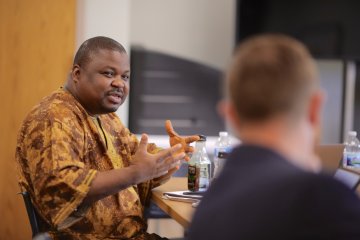Defend the Faith by Making Disciples
Defending the gospel is a biblical calling and a noble pursuit. The apostles, as we see through their extant writings, were continually on guard against the advance of false teaching and teachers. They regularly warned the church and its leaders not to depart from the faith once delivered to the saints (Jude 3). However, the ways in which we typically conceive of guarding the gospel, while not entirely passive, are nonetheless static and cerebral.
We encourage others to stand firm on the truth. We’re told to be unmovable in our convictions. We hold fast to sound doctrine. We rightly handle the word. We know whom we have believed and should be fully persuaded.
While those are certainly postures which the Bible commands, such are not the complete means by which we defend the faith. Instead, as Paul instructed Timothy, we guard the deposit by handing it off to future generations (2 Timothy 1:14; 2:2). We preserve the gospel by passing it on. We defend the faith by making disciples.
If you earnestly want to stand up for theological orthodoxy. If you are committed to the right handling of God’s word. If you are burdened by false teachers and false teaching. If you are disturbed by specious resources and alternative gospels. If, with Jesus, you are moved to compassion by misguided sheep and angered by wicked shepherds. If you are eager to see the knowledge of the glory of God fill the earth as the waters cover the sea, then you need to make disciples.
The old sports cliché works here: the best defense is a good offense. Which means our creeds are only as good as our catechesis. Delineating the faith, while crucially important and necessary, is only as good as discipling others in it. You can’t merely protect the inheritance—and the flock—through research and writing. You must entrust the good news to others. Because the gospel is validated and defended by changed lives, and it is propagated through love and example and community.
“Delineating the faith, while crucially important and necessary, is only as good as discipling others in it.”
The pillar and foundation of the faith is the church (1 Timothy 3:15). In other words, the people of God—those who know, believe, teach, and obey the truth—support the gospel itself. Of course, Jesus is the truth. He is the foundation and cornerstone. Yet Paul understood the church, in some inscrutable way, to function as the support structure of the truth. For this reason, defending the gospel and defending the church are almost synonymous for Paul.
Perhaps you’ve heard the well-worn sermon illustration for knowing and defending the truth. I’ve used it myself. It goes something like this: The best way to recognize counterfeit money is by familiarizing yourself with the genuine article. Which is true. However, that illustration doesn’t address how we might counteract such counterfeit measures. In order to do so you must print more authentic currency. You use better ink, advanced printing methods, and different paper. You inform banks and businesses. You provide detection equipment. You train cashiers and tellers. You go on offense.
The reality is this: You don’t have doctrine without disciples. You don’t get truth without trainees. There is no Christian orthodoxy without living, breathing, orthodoxy-observing Christians.
Jesus didn’t commission us to know and defend his teaching solely in the academy or an institution, not merely in a creed or confession. He also didn’t command us to curate it as an historical artifact in a glass display case. Instead, Jesus calls us to preserve his teaching by passing it on, through the living museum of disciples who are taught to obey every word: the Church.
A version of this article first appeared at Southern Equip
Elliot Clark (MDiv, The Southern Baptist Theological Seminary) served in Central Asia as a cross-cultural church planter along with his wife and children. Since 2016, he has worked with TLI equipping indigenous church leaders overseas and diaspora pastors within the U.S. He is the author of Evangelism as Exiles and Mission Affirmed.



